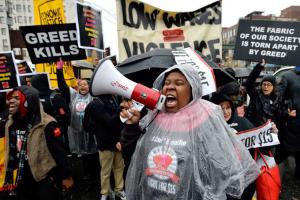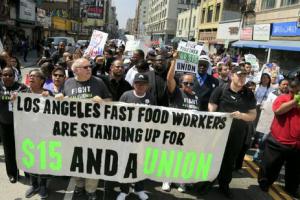‘I Cannot Survive on $260 a Week’: Us Retail and Fast-Food Workers Strike
The Guardian
 It’s been almost a decade since the Great Recession, and America has witnessed a record 82 months of month-on-month jobs growth. The national unemployment rate now stands at a 4.3%, a 16-year low. But month after month, it is the low-wage sectors – fast food, retail, healthcare – that have added new jobs. Wage growth has barely kept pace with inflation. The national minimum wage ($7.25) was last raised in 2009.
It’s been almost a decade since the Great Recession, and America has witnessed a record 82 months of month-on-month jobs growth. The national unemployment rate now stands at a 4.3%, a 16-year low. But month after month, it is the low-wage sectors – fast food, retail, healthcare – that have added new jobs. Wage growth has barely kept pace with inflation. The national minimum wage ($7.25) was last raised in 2009.
 New York Gov. Andrew announced his support for a $15 minimum wage for state employees on the same day that fast-food workers across the country demonstrated for better pay and union representation. All told, 10,000 New York pubic employees will receive a pay bump. In July, Cuomo increased the minimum wage for fast-food workers in New York through a state wage board.
New York Gov. Andrew announced his support for a $15 minimum wage for state employees on the same day that fast-food workers across the country demonstrated for better pay and union representation. All told, 10,000 New York pubic employees will receive a pay bump. In July, Cuomo increased the minimum wage for fast-food workers in New York through a state wage board.
 Under Trumka, labor has sought to extend its power by alliances, cooperating with African-American groups, immigrant groups, environmental groups and others as well as car wash workers and day laborers seeking to organizers. He points to the wave of Fight for $15 protests scheduled for April 15 as an example of a new way workers are flexing their muscles.
Under Trumka, labor has sought to extend its power by alliances, cooperating with African-American groups, immigrant groups, environmental groups and others as well as car wash workers and day laborers seeking to organizers. He points to the wave of Fight for $15 protests scheduled for April 15 as an example of a new way workers are flexing their muscles.
 Unions historically have supported minimum wage and occupational safety laws that benefited all workers, not just their members. But they also have recently begun investing major resources in organizing drives more likely to yield new laws than new members. Some of these campaigns seek to organize workers who, rightly or wrongly, aren't even designated as employees or lack a common employer, such as domestic workers and cab drivers.
Unions historically have supported minimum wage and occupational safety laws that benefited all workers, not just their members. But they also have recently begun investing major resources in organizing drives more likely to yield new laws than new members. Some of these campaigns seek to organize workers who, rightly or wrongly, aren't even designated as employees or lack a common employer, such as domestic workers and cab drivers.
Spread the word